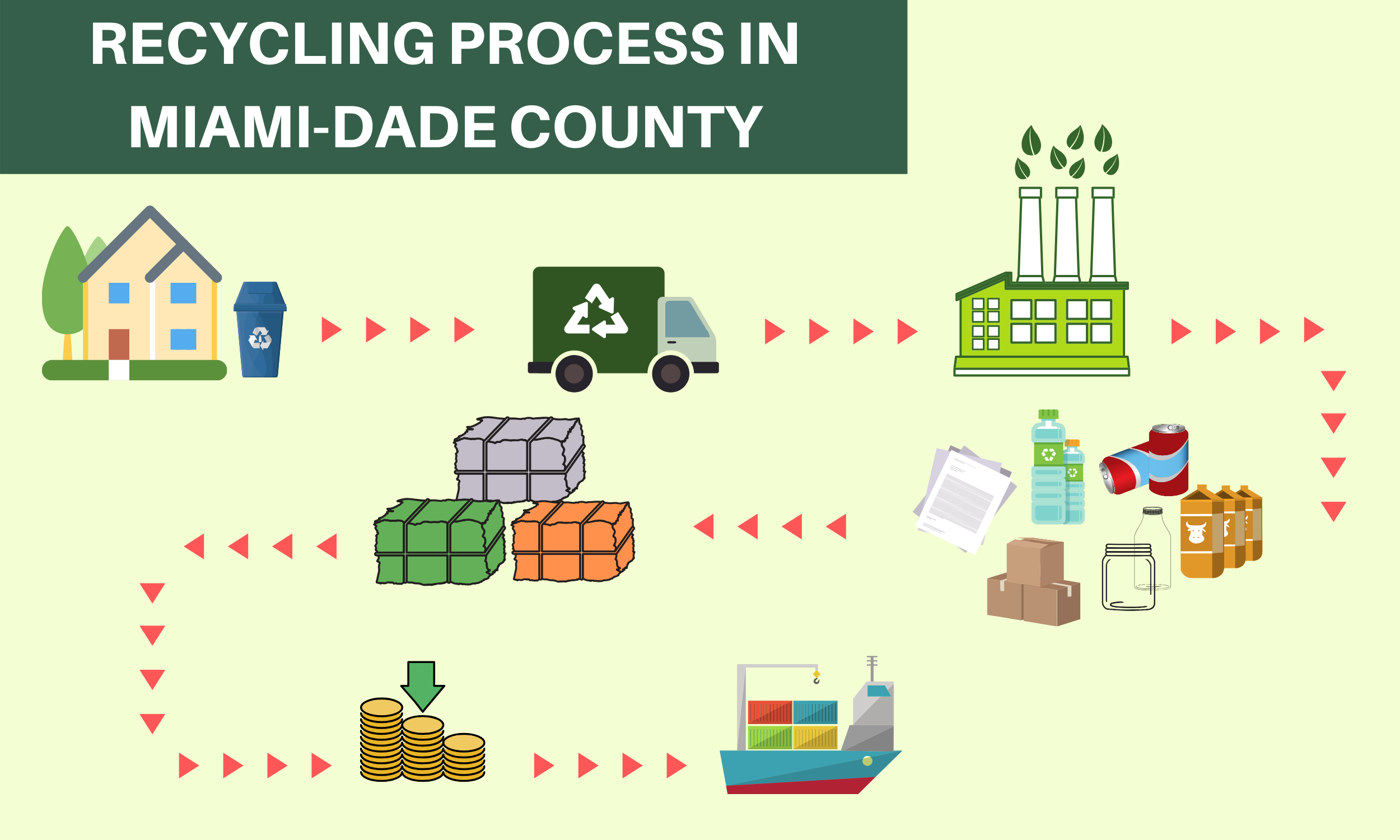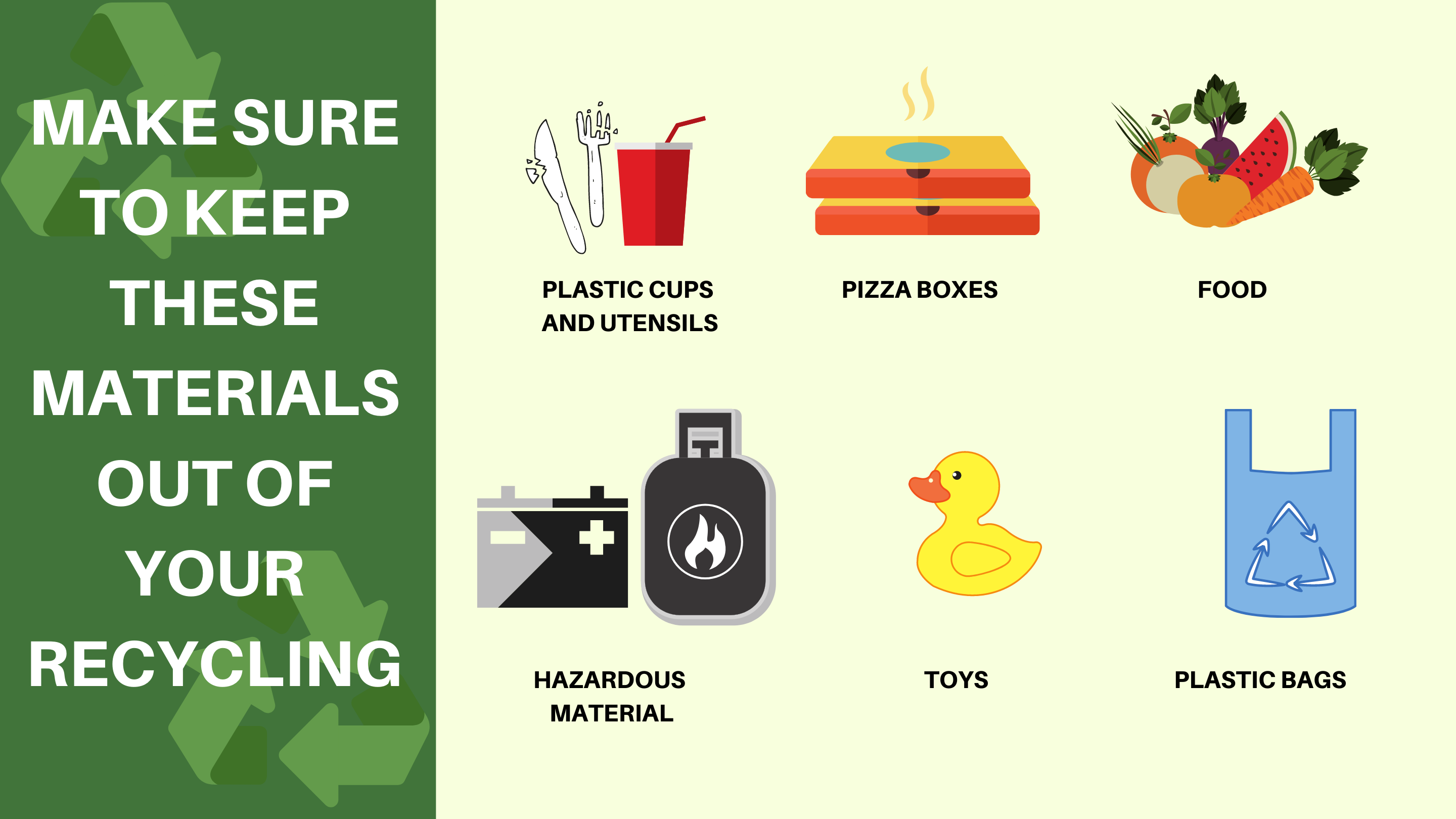The United States is facing a shrinking market for recyclables after China stopped buying commodities that are not 99.5 percent contamination-free. In South Florida the recycling process is becoming costlier and in some counties the recycling rates are alarmingly low. In Miami-Dade County, recycling rates are ranked as one of the lowest in the State. Even though much of what gets recorded as recycled by the Florida Department of Environmental Protection (FDEP) does not reflect the bigger picture. Contamination is a big issue as 30 percent of its recyclables are contaminated and only 18 percent gets recycled overall.
Jeanmarie Massa, Recycling Manager at Miami-Dade County, says other counties have done a better job at capturing all of their recycling and reporting it to the FDEP.
They have learned how to capture everything, like things that Goodwill is recycling and items like food banks. That material can be counted as recycled, but it’s not something that these entities readily give the information to FDEP.
Jeanmarie MassaMIAMI-DADE COUNTY RECYCLING HISTORY
Miami-Dade County has used private companies to handle its recycling since the 1990s. Until 2008 the county used a dual-stream recycling method which allowed residents to sort their recycling manually by separating the materials themselves. After that, Miami-Dade converted to a streamlined single-steam recycling method . This program has not changed in a decade and will remain in place for at least the next three years. In 2023, Miami-Dade County’s contract with their main recycling company Waste Management, Inc., will expire, prompting questions about whether the current program will remain in place, if it will be modified or perhaps even discontinued in light of rising costs and falling profits. In the mean time, Waste Management, Inc.’s officials say they prepared for the decrease in the market ahead of time.
Single-stream vs. Dual-stream
What is dual-stream recycling? Dual-stream recycling is when different – such as paper and plastic – recyclables are separated from each other by residents before they are picked by recycling trucks.
What is single-stream recycling? Single-stream recycling is when all recyclables are put in the same container and separated at sorting or recycling facilities by a company.

HOW DOES RECYCLING WORK IN MIAMI-DADE?
The county has contracts with three different private companies, these are two haulers and one sorting plant. Waste Connections and World Waste Recycling are haulers in charge of picking up the recyclables of every single-family home in the county and Waste Management Inc. sorts those recyclables. However, not every city or municipality in the county is part of the Miami-Dade recycling program.
.
MIAMI-DADE MUNICIPALITIES WITH A RECYCLING PLAN
Many cities and municipalities in Miami-Dade County are part of the county’s recycling program. Others have opted to contract private companies and implement their own recycling plans. The map on the left identifies the cities and municipalities that are part of the county’s recycling program (blue) and those that have opted to implement their own (green).
Despite having private companies take care of their recycling, some municipalities still end up sending their recyclables to Waste Management, Inc., which is the same company that handles the county’s recyclables.
The reason that some cities or municipalities contract with private companies instead of opting for the county’s plan is often related to costs and savings. Some cities may have their own hauling trucks which can manage the pick-up of the recyclables and it’s easier and cheaper for them to contract with a sorting company to complete the recycling process.
The county’s program is designed for single-family homes, but not for multi-family complexes. This is why we often observe the lack of recycling programs in complexes such as apartments or duplexes. Apartment complexes and condominiums are required to implement a recycling plan and those that don’t comply could be fined from $300 to $950 based on the number of units on the property and the amount can be assessed daily until compliance is met, according to the county’s website.
Our residential curbside program was designed to provide service to single-family homes, but Miami dade county has an ordinance that says all multi-family and commercial establishments have to have recycling, [or] be able to offer recycling.
Jeanmarie MassaWHAT ARE THE CURRENT PROBLEMS FACED BY THE COUNTY?
SHRINKING MARKET
China stopped being one of the United States’ biggest recyclables buyers and is now accepting only 99.5 percent uncontaminated materials. This makes it difficult for private agencies in Miami-Dade to find markets that will buy back recyclables as much of County’s recyclables are contaminated.
LACK OF AWARENESS
Residents’ lack of awareness of how to recycle properly has led to high level of contamination in Miami-Dade’s recyclable materials. Approximately 30 percent of recyclables that are picked by the County are contaminated which means they don’t get recycled.
BURNED OR STACKED RECYCLABLES
Much of what doesn’t get recycled ends up in landfills – one of the biggest contributors of Methane, a greenhouse gas, in the world – or burned to generate energy. In some cases, the recyclables that are not successfully put back on the market end up stacked in warehouses for a while.
DATA INACCURACY
Recycling in Miami-Dade County does not get recorded in the same way general waste does. This means that much of what gets recycled is not reported to the FDEP in Tallahassee. Some county officials cite this as a reason to why published recycling numbers in the county are so low.
MARKET DEFICIT AND COST
Recycling is becoming a less cost-effective market, making it more costly to bail material and resell material. The market for certain recyclables, such as glass, keeps shrinking. This sometimes leads to glass being sent to landfills after the sorting process. With changes in the market and technology advancement, certain recyclables have lost their value.
HOW DO MIAMI-DADE RESIDENTS RECYCLE?
Miami-Dade residents submitted videos through social media showing how they recycle at home. Many were educated about what goes in their blue recycling bin, but some others threw in items that might contaminate or delay the recycling process.
Leo Cosio
Leo is doing a good job at recycling, however the county only asks for narrow neck bottles when it comes to plastics. The plastic cards that he is throwing in the recycling bin are too small for Reuter Recycling facility to process.
Zoe Soler
Zoe has the best intention when recycling at home. Some of the things she is recycling are correct! However, plastic bags are not recyclable and may delay the sorting process in the recycling plant. Reuse your plastic bags and throw them away in the garbage bin once you’re done with them.
Edda Leon
Edda’s recycling method is very effective! Residents, in many cases, go out of their way to recycle right and even recycle outside of the county’s program. Edda is an avid recycler and sends her empty Colgate toothpaste tubes back to the company so they can recycle them properly.
As much as some residents try to recycle properly, the truth is that many fail to recycle right. Over-complicating what does and doesn’t go in the blue bin ultimately ends up contaminating our recyclables or delaying the recycling and sorting process.
Some times you have to understand the 80/20 rule. That sometimes 20 percent of the impute is 80 percent of the output. There might be a small group of people that mistakingly puts garbage in there, and then it kind of ruins the whole load. That happens all the time.
Shiraz KasharREUTER RECYCLING FACILITY
All the recyclables collected by the county in the curbside single-stream program end up in Waste Management Inc.’s Reuter Recycling Facility. This sorting and recycling facility located in Pembroke Pines is one of the largest in the country. Reuter sorts all of the materials possible and tries to place them back in the market. However, audits done by the company show that Miami-Dade has a 25 to 30 percent contamination rate. What’s contaminated endS up being sent to one of Waste management, Inc.’s landfills.
ALTERNATIVES TO LANDFILLING
Covanta is an Energy-from-Waste (EfW) company and can be seen as an alternative to landfills, EfW takes non-hazardous waste that is destined for landfills, combusts it in specially designed boilers and recovers the heat to generate steam to use in energy generation or other industrial processes. Covanta’s facility in Doral, burns waste and turns it into energy which in turns helps power local grids. This process still produces methane which is detrimental for the environment, however the methane production is at a much lower rate than the rate produced from landfilling.
Industry leaders coin education as a major component that should be addressed as one of the biggest issues hitting the recycling industry.
Education and focus on quality is key right now. From materials that have little contamination, there are definitely markets out there. But it’s effectively because of chinas push back, [that] it has become a buyers market in terms of the recyclable commodities. With that said tho, if you can generate more quality streams of recyclable commodities and make sure that you’re not doing that “wish-recycling,” that will be very helpful in terms of getting your local community recyclables in the shape that they can end up back in the market.
Michael Van BruntThe department since we started this program even before, when it was dual-stream, there always been a strong education component. This program is no different. We’ve been educating our resident since the very first day that we delivered the new carts to them.
Gayle LoveRECYCLING RATE AND CONTAMINATION
- MIAMI-DADE COUNTY RECYCLING RATE IN 2017 18%
- CONTAMINATION RATE AT REUTER RECYCLING FACILITY 30%
According to Shiraz Kashar, from Waste Management, Inc., approximately 25 to 30 percent of the recyclables they receive are contaminated, meaning that 70 percent of the material gets recycled. However, in 2017, the county’s recycling rate was a low 18 percent according to the Florida Department of Environmental Protection (FDEP), resulting in majority of recyclable materials ending up in landfills or being burned.
HOW TO RECYCLE PROPERLY IN MIAMI-DADE COUNTY
When in doubt, throw it out! If you are unsure as to what you can or cannot recycle throw it out. Keep your recycling simple, boil it down to the FIVE recyclables the county is actually recycling.

Bottles
The county recycles narrow-neck plastic bottles and glass bottles.

Cartons
Rinsed juice and milk cartons.

Cardboard
Flattened cardboard boxes and/or cardboard material.

Cans
Rinsed aluminum and steel cans.

Paper
Clean and dry newspaper, phonebooks, paper bags, magazines.

HOW CAN YOU CONTRIBUTE?
If you live in a single-family home and your recyclables are getting picked up by the county, the best way to recycle is to keep it simple with the five material the county recommends. The county explains what recyclables are acceptable on their educational campaign. Don’t complicate your recycling, it’s better to put less in your bin than end up contaminating your whole load.
